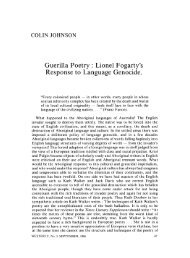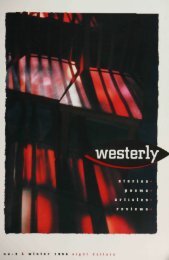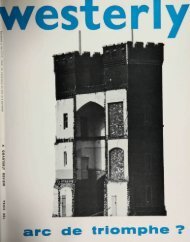invocation of pastoral near the beginning of thebook as the men build a tower for the bomb inthe desert heat:The tower was like a living thing. It was partlythat, in the absence of trees, crows and galahsperched on its steel webbing. Rabbitscrouched in burrows at its four feet. Giventhat the country, the ground itself, was sodried out and lifeless, there was a surprisingnumber of birds.This is followed by one of the book's raredescriptions of some actual effects of the blast:Later, when there was nothing left of thetower, Graham saw hundreds of [birds ] dead,burnt or tom apart, and rabbits who'dsurvived the blast hopping around with theirjaws eaten away ... (p.6)Immediately after this test, the men go slightlymad with relief, excitement and a sense of guilt(pp. 61-3). The rest of the book is an explorationof precisely what has occurred in the blast andwhat it means to be involved - howeverindirectly - in such an act. And as Australiaemerges from the Menzies years of spuriouscertainties and finds itself in the messy, confusingperiod of the Vietnam war and beyond, it beginsto confront the notion of responsibility for itsown actions, and to mourn those who have beensacrificed to a series of unreliable symbolicfathers. As Deborah gradually drags herself outof a dependent, child-like role of 1950s housewifeto attend university and learn something aboutfeminism, so Graham educates himself toconfront his own actions and those of his malementors. It is a painful process which nearlydrives them apart, and the book ends withGraham's return to Maralinga to continue hisinvestigations and to mourn his friend Foley,dead from radiation-induced cancer.Here, he writes a new kind of text on the land'ssurface. Whereas during the tests he wasrequired to map out a huge square grid andmeasure areas of radiation, unwittinglycontributing to fictions about safety (as much ofthe worst radiation fell beyond the grid area andtherefore did not officially exist), now he drawsa modest circle in the sand and enacts a brief,helpless ceremony there in memory of his friend.Maralinga, My Love raises difficult andtimely questions about the relationships betweenpower and gender identity and their effects uponindividuals, their society and their landscape. Itis a book to read many times for its thoughtfulexploration of the complex connections betweenpsychoanalysis and politics in modernAustralian history, for its tightly controlled angerand for its superbly understated style.Trudi TatePeter Kocan, Flies of a Summer, Angus &Robertson, 1988, $17.95.Ken Methold's satirically entertainingoutburst at the 1989 Sydney Writers andReaders Festival seems to have set a thylacineamong the Australian literary rosellas. Claimingto be in possession of a telepathic letter from acorrespondent in Mt Isa, Methold took to taskthe Australian Literature Board and the innercircle of the Sydney writing establishment.Using arguments that are about as extinct asAustralia's marsupial pseudo-tiger, Methold's"correspondent" fulminated against the selfcongratulatoryclosed coteries of Balmainwriters and critics, and the second-rate natureof Australian writing that is "not even publishedoverseas". At these observations, even theusually good-natured and scrupulously-urbaneDon Anderson, for example, flew into the air asaflutter and irate as Bill Collins defending aparticularly awful movie, demanding thatMethold name names, and "put up or shut up".There is a suspicion that Methold may havetouched a few raw nerves.It is, nevertheless, disturbing to have suchmythic concepts as "second-rateness" and thecriterion of "greatness" as something that isfound only "overseas" (Baffin Island, perhaps?)resurfacing, as if overseas literary circles weresomehow more "objective" and less selfinterestedthan Australia's own.This brings me to the discussion of a book thatmust surely be un-great. To my knowledge, PeterKocan's Flies of a Summer has yet to bepublished, or even have its existenceacknowledged, on Baffin Island. Is it thus"second rate"? Perhaps. But it may be moreuseful to observe that Flies of a Summer failsto identify its target audience, falling betweengeneric stools, and could do with furtherresearch and development.112WESTERLY, No.2, JUNE, 1989
Initially, one has the impression that Flies ofa Summer is meant to be a fantasy novel,although still haunted by Kocan's prisonexperiences. Here, however, the prisoners areneither "criminals" nor "lunatics", butgenerations of children bred by ambitious butdunderheaded Margai explicitly for the serviceof powerful and mysterious Gorgai. TheseMargai, although resembling the brutal screwsin The Treatment and The Cure, derive theirliterary heritage from science fiction, or frommore traditional fantasy figures, such asTolkien's goblins, the bickering Uruk-hai. TheGorgai, apparent prime-movers of the systeminstituted in Kocan's primitive future world, alsohave a fantastic heritage: they live in distantmountains, like the Wicked Witch of the West,or Sauron of Mordor.Yet as inhabitants of a fantasy world, thesymbolic function of these creatures as agents ofevil, or some such, is ambiguous. They oftenappear to be thoughtless, rather than malicious,towards the children in their charge, and pitifullydumb, rather than cruel. This is especially trueof the Margai:[Flat Nose] does not know how to build aproper Margai hall. He's just going by hisrecollection of how the old one looked andso keeps giving us the wrong orders. . .Normally Flat Nose would be irritated to thepoint of slaughtering half of us, but now heseems sulky and remote and hardly seems tocare what we do so long as we're busy ...The Margai, however, seem too preoccupiedslaughtering each other for the narrator's fear tocarry any real weight. They would thus appearto represent the imposition of indifferent powerupon humanity. But the meaning, source andresult of this exertion of power remainsannoyingly vague, both symbolically and interms of the book's created world. Nor, in theend, is it made to seem particularly terrifying.Indeed, in some ways, these Margai havecreated, as if by accident, a literal state of idealinnocence for their child prisoners to live in. Butdespite this blurring, the Margai are notindividualised enough to function in a realisticinstead of a symbolic mode. They are never"people", in the sense of possessing a Forsterian"roundness". Even regarded as "flat" characters,they are, in the main, minimally sketchedstereotypes.The same observation may be made of mostof the children, the "Flies of a Summer" referredWESTERLY, No.2, JUNE, 1989to in the title. Perhaps the most interesting partof Kocan's novel is his attempt to render thesechildren as innocent of good and evil, and,especially, of time. They have no history andonly the vaguest concept of their future. All theyknow is that they live to mate and then to besent into slavery. This, perhaps, is intended tofunction as a sort of broadly sketched allegoryfor ta condition humaine. There are, of course,important exceptions to this general rule - therebels who generate the tale. The mostimportant is Rowan, the born leader, whofunctions as a sort of heroic Christ figure. It isRowan's adventurous spirit that leads thenarrator upon an expedition which results inmeeting the "Grown Up Man". This Man,apparently some remnant of a previouscivilisation (perhaps our own), reveals to thenarrator a glimpse of the past, and hence thefuture, which in this world, innocent of history,is like knowledge of Good and Evil.The mysterious Grown Up Man is thus thecatalyst who provides the knowledge whichfinally distinguishes this season's "flies" from allthe other generations. Yet with this character, too,Kocan is caught between the fantastic and therealistic mode. On the one hand, in the fantasymode, he functions like Merlin, some extratemporalDr Who, a prophet from the past; onthe other hand, in the realistic mode, he ispresented as a degenerate hermit with an alcoholproblem. Perhaps he is intended to function asan ideal symbol of human weakness. But if so,he is neither ideal nor human enough to beconvincing. Again, his epithet, the "Grown UpMan", as well as many of the other propernames, may lead us to believe we are in a worldof juvenile fantasy. Indeed references to"booguls" - Kocan's bogey-men - tempts usto regard the book purely as a piece of children'sfiction. Yet this mode, also, is belied by some ofthe language and explicit sexuality, which wouldseem outside the generally accepted conventionsof such writing.Despite these reservations, Flies of a Summeris still a good read, as we, with the narrator, seeka sense of the past for an idea of the future,beyond the idyllic, timeless life of the childrenin the village. Emotionally, the book is about thecoming to terms with the termination of thisparadise as the children are brought to the stageof breeding (there are echoes here of the Fall ofAdam and Eve, but the event is regarded asfulfilling) and slavery (too vague to be113
- Page 3 and 4:
CONTENTSWESTERLYVOLUME 34, No.2, JU
- Page 5:
WESTERLYa quarterly reviewISSN 0043
- Page 8 and 9:
JAN KEMPTo My Father, M.H.K.My fath
- Page 10 and 11:
JAN KEMPThe GypsySuddenly before yo
- Page 12 and 13:
WONG PHUI NAMA Death in the WardThe
- Page 14 and 15:
WONG PHUI NAMCousinI had to call to
- Page 16 and 17:
WONG PHUI NAMObitIt is as thin smok
- Page 18 and 19:
So thus I lie here fearful of movem
- Page 20 and 21:
VIRGINIA BERNARDA ValedictionWhen N
- Page 22 and 23:
"Yeah, yeah," I call, returning the
- Page 24 and 25:
she flops for a bit, slurps her tea
- Page 26 and 27:
well her students did, she was neve
- Page 28 and 29:
English or Indian, that they had th
- Page 30 and 31:
ANDREW TAYLORSpringSpring is a dive
- Page 32 and 33:
CAROL SElTZERAiming for the MouthTr
- Page 34 and 35:
GRAEME WILSONA Selection of Japanes
- Page 36 and 37:
a highly ambivalent attitude to his
- Page 38 and 39:
Esson attended some rehearsals of T
- Page 40 and 41:
the literary life of Bloomsbury. Lo
- Page 42 and 43:
Without Yeats Esson would quite lik
- Page 44 and 45:
"What theatre do you have in Austra
- Page 46 and 47:
In the back room Esson could feel t
- Page 48 and 49:
"When we started our little theatre
- Page 50 and 51:
a screen against a wall. A theatre
- Page 52 and 53:
VINCENT O'SULLIVANSinging Mastery:
- Page 54 and 55:
flighty relation in most statements
- Page 56 and 57:
living and the dead; that places hi
- Page 58 and 59:
quite diverse traditions towards th
- Page 60 and 61:
WARRICK WYNNEThe Wetlands (for Liam
- Page 62 and 63:
JAN OWENSmileOur mother aimed the b
- Page 64 and 65: RICHARD KELLY TIPPINGOlympic Airway
- Page 66 and 67: DAVID REITERBear by the Jasper Road
- Page 68 and 69: (At twenty eight you did not bother
- Page 70 and 71: left, would have risen and walked o
- Page 72 and 73: He had hair like mine used to be, t
- Page 74 and 75: OLIVE PELLThe QuestionTell me how t
- Page 76 and 77: BRIAN MOONANAT 515: MASS LECTURE Th
- Page 78 and 79: PETER KIRKPATRICKTear HereThe bay i
- Page 80 and 81: JOHN WINTERThe Bird ManIn wooded, p
- Page 82 and 83: KNUTE SKINNERAugust 15There's a lig
- Page 84 and 85: M.E. PATTI WALKERThe Hook"Aren't yo
- Page 86 and 87: QMNQMNQMNQMNapartheid man, this is
- Page 88 and 89: QMNQMNQMNeasy because you don't bel
- Page 90 and 91: lands or which have been taken over
- Page 92 and 93: GEOFF GOODFELLOWToo MuchDianne is 1
- Page 94 and 95: SHANE McCAULEYSouth Fremantle, Summ
- Page 96 and 97: JEAN KENTWaiting Out the DroughtWai
- Page 98 and 99: STEPHEN MAGEEJesus Falls, South Aus
- Page 100 and 101: SIMON BROWNBlue Hole, Santothe colo
- Page 102 and 103: CONAL FITZPATRICKA Brown Dog, Off A
- Page 104 and 105: PAUL HETHERINGTONOne RoomIn teeming
- Page 106 and 107: society, or, in the terms of the my
- Page 108 and 109: emphasised (I think) in the referen
- Page 110 and 111: Summer Leaves". This continues the
- Page 112 and 113: Deficiency Bill in Western Australi
- Page 116 and 117: particularly dreaded). The final re
- Page 118 and 119: VINCENT O'SULLIVAN - is one of New







